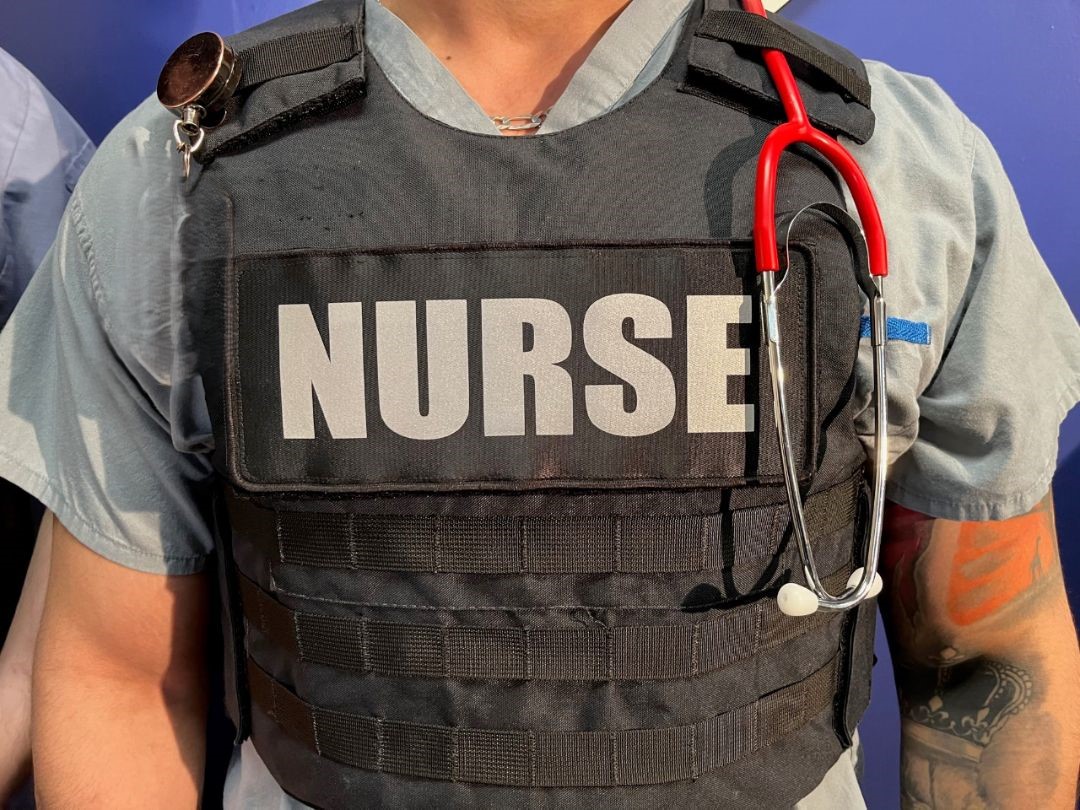A 17-year-old female has been arrested and is facing charges in the Rotorua Youth Court of intent to cause grievous bodily harm, assault and possessing an offensive weapon.
NZNO nurse and delegate Mitchell McLaughlan told Kaitiaki the Rotorua nurse was recovering but was highly traumatised by the “rare and random” event on December 28.
“This is just one of those incidents which have, in recent times, become more frequent. We’re seeing more of society that is highly distressed due to social situations, increased drug use — and just generalised anti-social behaviours.”

He said standard protocol appeared to have been correctly followed, with two staff — the nurse and a doctor — attending the weekend callout, in the suburb of Ngongotahā.
‘Perhaps if they had been seen during standard working hours with those standard procedures, they wouldn’t have got this far down the track.’
But fearful staff had raised whether extra security measures — such as personal alarms or stab-proof vests — should be worn from now on by nurses and kaiāwhina working in community mental health.
“We would like to have a suite of options available for the clinicians, so we would be able to choose what’s appropriate for the situation we’re stepping into,” said McLaughlan, who is Te Whatu Ora Lakes health and safety representative.
‘Full review’ underway — Te Whatu Ora
Te Whatu Ora Lake’s general director operations Alan Wilson said a full review was underway “which involves looking into options, systems and processes available that will ensure it is safe for our staff to work in the community and prevent similar incidents occurring in future”.
Wilson said the health and safety of staff was “top priority”.
“No level of violence or aggression towards our staff caring for the sick, whether that be in the hospital or community, is acceptable and will not be tolerated”, he said in a statement.
Support had and would continue to be offered to the staff member following the alleged assault as Te Whatu Ora awaited the result of the police investigation, he said.
In an urgent letter to Te Whatu Ora this week, McLaughlan says a lack of equipment, specialised support, training, supervision and debriefing sessions had all contributed to the recent assault.
“This incident highlights critical gaps that jeopardise both staff safety and the quality of care provided to our clients.”
Invoking workplace health and safety legislation in the letter, McLaughlan warns that the risk to community mental health staff is “high” and recommends:
- Enhanced security such as panic alarms, more specialist-trained security guards and staff-led risk assessment.
- Regular staff meetings.
- Counselling and specialist support for staff who experience traumatic incidents.
- Updated risk assessments involving mental health staff and health and safety officers.
- Increased staffing to ensure safe nurse-to-patient ratios.
Stab-proof vests and the recent reduction in police support for mental health callouts would also be discussed, he told Kaitiaki.
“[The question is] whether any of these aids will actually be applicable or appropriate to use in the future. It’s still very early days on that, as it’s a random and rare event that happened. But we are seeing an increase in these escalating behaviours in the community over the last few years.”
NZ Police last year announced they would only attend mental health callouts if there was an “immediate risk to life and safety“, citing lack of resources. The change is being phased in by September 2025.
McLaughlan told Kaitiaki while police would not necessarily have accompanied the nurse and doctor in this case, he was deeply concerned about the impact of the withdrawal on mental health resources.
He said staff — who were already experiencing low morale, stress, fear and burnout due to a lack of support — needed to be kept informed of how management planned to keep them safe in future.
‘We shouldn’t accept that nurses have to deal with such a level of violence they need stab-proof vests.’
McLaughlan has also told Kaitiaki as other community social and health services were so overworked, the person wasn’t able to be seen during standard working hours.
“Perhaps if they had been seen during standard working hours with those standard procedures, they wouldn’t have got this far down the track.”

NZNO-Tōpūtanga Tapuhi Kaitiaki o Aotearoa and the Public Service Association (PSA) — which both represent mental health nurses — are calling for a full investigation by Te Whatu Ora and WorkSafe, and for the matter to be referred to the Health Quality & Safety Commission.
WorkSafe is New Zealand’s workplace health and safety regulator, while the Health, Quality & Safety Commission’s role is to monitor and improve the safety of our health system.
NZNO mental health nurses section chair Helen Garrick said she understood nurses were afraid, but warned against “knee-jerk reactions” like bringing in stab-proof vests.
However, nurses needed to be safe when attending callouts and “all aspects” of the incident needed reviewing, she said.
“We shouldn’t accept that nurses have to deal with such a level of violence they need stab-proof vests.”
PSA health national sector lead Sue McCullough said the nurse, a PSA member, had needed surgery after the attack, however had now been discharged from hospital and was recovering at home.
“Health-care workers’ safety is paramount as they deliver essential health care to all New Zealanders.”
McCullough said “devastating” incidents like this highlighted the consequences of “relentless health budget cuts”.
Violence to nurses ‘saddening’
Just days after the Rotorua stabbing, an emergency nurse at Middlemore Hospital was allegedly punched then choked to unconsciousness by a patient. It took five colleagues — including a nurse with rugby skills — to get the man off and subdue him before hospital security and police arrived at the same time, staff told Kaitiaki.
The nurse, a male, is recovering in hospital with lacerations but is also highly traumatised, colleagues have said. Middlemore Hospital has since stepped up security after staff called for more security guards to be present in ED, and also offered mental health support to affected staff.
A 23-year-old man has been arrested and is facing charges of assault and impeding breathing in the Manukau District Court this month.
Te Whatu Ora national chief clinical officer Richard Sullivan has said it was “saddening” to hear of multiple incidents of violence against its staff recently.

Te Whatu Ora was offering extensive support to affected staff at both Middlemore and Rotorua, he said.
“No level of violence is acceptable and we await the outcome of the police investigations underway into these incidents.”
Minister of Health Shane Reti has also said violence against health workers was “unacceptable”.
NZNO kaiwhakahaere Kerri Nuku has said nurses were increasingly facing volatile situations as hardship grew.
“Whānau are struggling with the stress of the rising cost of living and this leads to increasing levels of frustration which play out during home visits or long wait times at EDs.”




